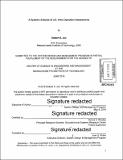A systems analysis of U.S. Army operation assessments
Author(s)
Joo, Delbert S
DownloadFull printable version (16.72Mb)
Alternative title
Systems analysis of US Army operation assessments
Systems analysis of United States Army operation assessments
Other Contributors
Massachusetts Institute of Technology. Integrated Design and Management Program.
Advisor
Donna H. Rhodes.
Terms of use
Metadata
Show full item recordAbstract
The U.S. Army conducts assessments throughout all levels of warfare in order to gain a better understanding of progress towards a goal. The Army specifically conducts operation assessments to measure the effectiveness of employing military forces. The assessment process is an iterative activity that is present throughout the mission planning process. The current state of operation assessments is the result of doctrine and methodology developed over the past decades of warfare. However, the need for further development of the assessment process has been identified by several stakeholder groups within the ecosystem. This research aims to provide a thorough analysis of the operation assessment enterprise and provide recommendations for opportunities of architectural improvement. The research methodology includes a literature review, stakeholder assessments and interviews, and systems analysis methods applied within an Architecting for Innovative Enterprise Strategy (ARIES) framework to assess current state conditions and identify opportunities of transformation for a future state system. The proposed future state elements are then analyzed to determine an increase of value delivery across multiple levels of the assessment process. The research identifies opportunities in system design that can be further developed to better deliver value to stakeholders. The implementation of assessment-specific training is assessed to have the most impactful effect upon multiple levers of the system. Additional capability awareness training and advocacy of the process to key stakeholders can also work to propagate more effective assessment products and services. Finally, the analysis of assessment capabilities as an accumulation of information supports recommendations to implement measures that better capture and disseminate experience within the system.
Description
Thesis: S.M. in Engineering and Management, Massachusetts Institute of Technology, System Design and Management Program, 2018. Cataloged from PDF version of thesis. Includes bibliographical references (pages 102-104).
Date issued
2018Department
Massachusetts Institute of Technology. Engineering and Management Program; Massachusetts Institute of Technology. Integrated Design and Management Program.Publisher
Massachusetts Institute of Technology
Keywords
Engineering and Management Program., Integrated Design and Management Program.